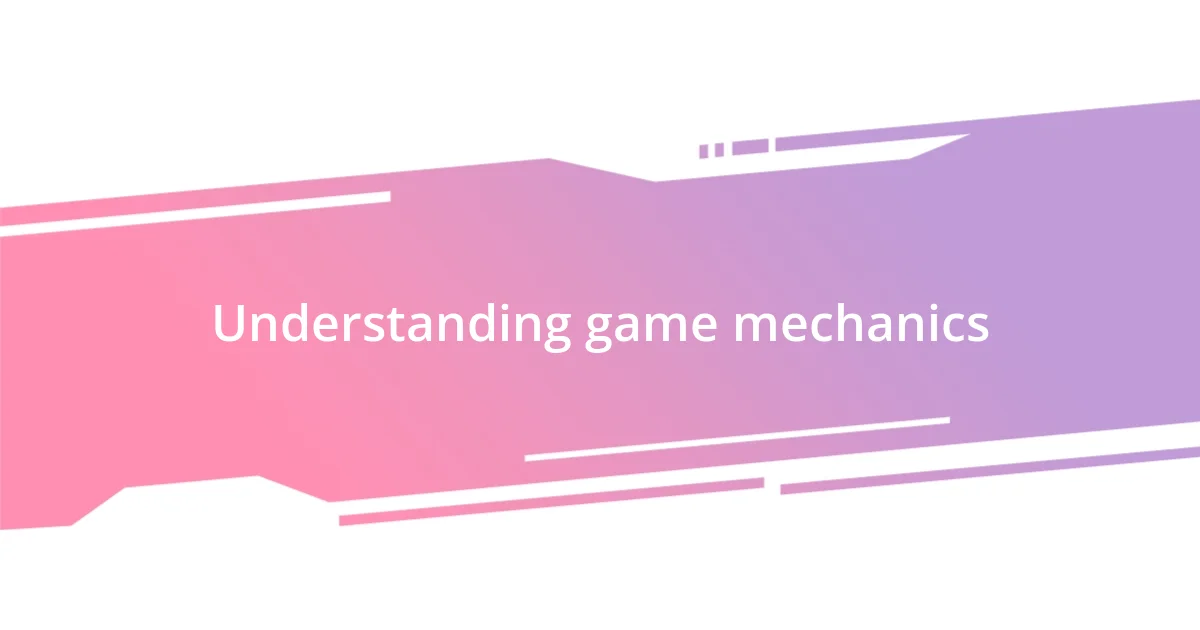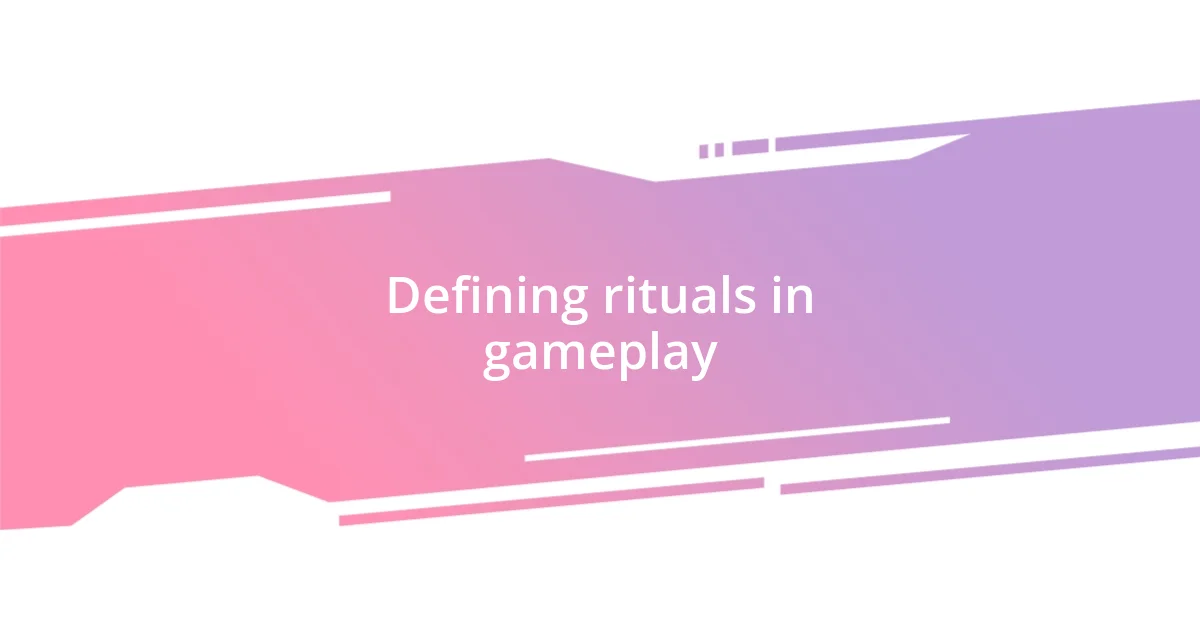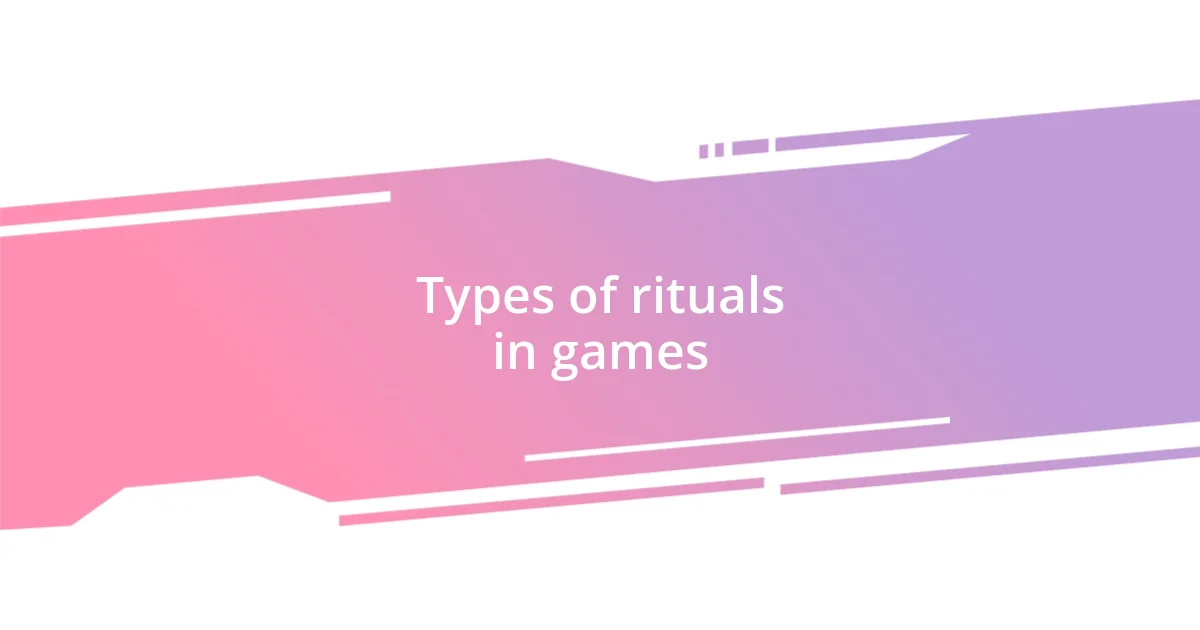Key takeaways:
- Game mechanics are crucial for player immersion and emotional connection, influencing gameplay and relationships.
- Rituals enhance player experience by providing structure, fostering anticipation, and creating social bonds through repeated actions.
- Effective implementation of rituals can deepen emotional ties to the game, encourage community engagement, and empower players to craft their own meaningful experiences.

Understanding game mechanics
Game mechanics are the fundamental rules and systems that govern player interactions and experiences within a game. For me, understanding these mechanics is akin to deciphering the language of the game; it’s how I immerse myself fully. Have you ever played a game, only to feel lost and disconnected? That’s often the result of not grasping these underlying systems.
When I first dabbled in strategy games, I felt overwhelmed by the mechanics, each one serving a purpose and affecting gameplay in ways I didn’t initially recognize. I remember my first victory in a complex tower defense game; it wasn’t just luck but a careful understanding of how each unit interacted with the others. Those little “aha!” moments made me appreciate the depth of game mechanics and how they could create rich and engaging experiences.
Additionally, it’s fascinating how game mechanics can evoke emotions. Take a cooperative game, for instance; when I play with friends, the mechanics promote teamwork and communication, generating a sense of camaraderie that enhances the overall experience. Can you recall a time when a game brought you closer to someone through its mechanics? For me, it solidifies just how critical these elements are in shaping not just gameplay but relationships too.

Defining rituals in gameplay
Defining rituals in gameplay involves understanding how certain repeated actions or behaviors can enhance the player experience. I’ve seen this firsthand in games with daily quests or special events. These rituals not only provide structure but also foster a sense of anticipation and belonging. For example, in a role-playing game where I log in daily to complete specific tasks, I feel a stronger connection to the game world. Does that resonate with you?
Moreover, rituals can create a rewarding cycle of engagement. In my experience, participating in seasonal events or challenges imbues my gameplay with purpose and excitement. When I align my gaming sessions with these events, I’m more likely to invite friends to join. Those shared moments during a Halloween-themed challenge made for some of my favorite memories—everyone dressed up characters in celebration and strategizing together. Such instances showcase how rituals not only enrich gameplay but also weave social bonds.
Interestingly, the impact of rituals can vary across different genres. For instance, in competitive games, committing to specific warm-up rituals can elevate performance. I remember spending extra time setting up my avatar and practicing moves ahead of a tournament. It may seem trivial to some, but that preparation became a pivotal part of my approach. Rituals, whether casual or structured, shape how we interact with the game and with each other.
| Aspect | Rituals in Gameplay |
|---|---|
| Definition | A repeated action or behavior enhancing player engagement |
| Purpose | Creates structure and anticipation |
| Emotional Impact | Fosters connection and social bonding |
| Examples | Daily quests, seasonal events, competitive warm-ups |

Types of rituals in games
Rituals in games often manifest in various forms, each tailored to enhance the player experience in unique ways. From my observations, these rituals can serve as powerful tools that not only structure gameplay but also deepen emotional investment. I recall the thrill I felt gearing up for a midnight launch of a new game. The anticipation built up over weeks culminated in that moment, transforming the experience into a communal ritual as I joined other gamers eager to dive in together.
Here’s a quick overview of common types of rituals I’ve encountered:
- Daily Quests: Tasks players complete regularly to maintain engagement.
- Weekly Challenges: More demanding targets that encourage long-term commitment.
- Seasonal Events: Timed celebrations that distract from the routine, often filled with unique items and themes.
- Preparation Rituals: These could include warm-ups or character setups before competitive matches.
- Social Gatherings: In-game meetups or events to celebrate milestones with friends or communities.
Each of these rituals holds a distinct flavor, influencing how we interact with the game and fostering connections with other players. For instance, I’ve formed lasting friendships through cooperative seasonal events—those late-night raids where we strategized, laughed, and sometimes stumbled upon unforeseen surprises made each session memorable. It’s fascinating how the structure of rituals can bring people together, creating shared experiences that linger long after the game is over.

Integrating rituals into mechanics
Integrating rituals into game mechanics can really elevate the player’s experience, and it’s something I personally strive to weave into the games I develop. When I design a game, I think about how daily login bonuses or specific achievement milestones can become rituals for players. For example, I’ve often found myself logging in every morning just to collect my daily rewards, which not only instills a sense of routine but also transforms those moments into a little personal ceremony.
Furthermore, I’ve seen the introduction of community rituals, like synchronized in-game events or unlockable content that’s available only during particular seasons, create a vibrant sense of excitement. I remember participating in an annual in-game festival that brought players together for a weekend of races, crafting, and shared laughs. The thrill of checking in with friends and competing for unique rewards was a joy that kept me engaging with the game well after that weekend ended. How do you think becoming part of such communal activities enhances your gameplay?
There’s also the beauty of integrating preparation rituals, especially in competitive settings. I’ve developed a habit before tournaments of replaying my favorite matches, visualizing strategies, and even upgrading my character in specific ways. This preparation not only bolsters my confidence but also aligns my mindset with the ritual’s intent, which ultimately impacts my gameplay performance. Do you have any pre-game routines that get you in the zone? I’ve found that embracing these small rituals makes every match feel more significant and purposeful.

Case studies of effective rituals
When I think about effective rituals in gaming, one case that stands out is the infamous “raid night” many guilds adopt. I remember when my group settled on a specific night each week to tackle difficult dungeons. This wasn’t just a gameplay strategy; it was an event we all looked forward to, building camaraderie through shared triumphs and epic fails. The energy and anticipation we felt leading up to these sessions were similar to preparing for a major sporting event. Don’t you feel that same rush when you know a big challenge is ahead?
Another great example is the way some players curate their character’s appearance before heading into battle. I once knew a fellow gamer who spent hours perfecting their character’s outfit, right down to the tiniest detail. It wasn’t merely cosmetic; it was a personal ritual that gave them a boost of confidence. Every time they entered a new arena, they felt a surge of pride and readiness. Doesn’t it resonate with you that such small preparations can significantly impact how you perceive gameplay?
Lastly, seasonal events in games like “Animal Crossing” offer an incredible insight into using rituals effectively. I remember participating in “Bug-Off” events, where players would compete to catch the most bugs over a weekend. The excitement was palpable, and it encouraged not only competitive spirit but also community bonding as players shared strategies and traded rare catches. Just think about how these ritualistic gatherings can deepen our emotional ties to a game and its community. Doesn’t that transform gaming from a solitary act to a shared celebration?

Best practices for implementing rituals
One best practice for implementing rituals in gameplay is to ensure that they resonate emotionally with players. I recall a time when I joined a new guild and we decided to establish a monthly “achievement night.” Each member would share their proudest in-game accomplishments, and we celebrated each other’s successes. This practice not only solidified our bonds but also motivated us to push ourselves further. Have you ever felt that surge of pride when sharing your wins with a community?
Another effective strategy is to seamlessly integrate rituals into daily game mechanics. I remember when a developer introduced daily challenges that aligned with real-world days of the week, like “Mystical Monday” or “Treasure Tuesday.” This clever twist didn’t just shake up the routine; it made logging in feel fresh and exciting. I found myself eager to see what new adventure awaited me each day. How do daily surprises influence your own gaming habits?
Lastly, offering players the ability to create and customize their own rituals can foster a deeper connection to the game. I experimented with setting up my own cozy in-game corner where I could convene with friends for fireside chats and resource sharing. This personal touch transformed our interactions into a cherished tradition. What unique rituals have you crafted in your gaming experiences that made them more meaningful? Embracing the idea that players can mold their own rituals can really enhance their sense of agency and attachment to the game.














